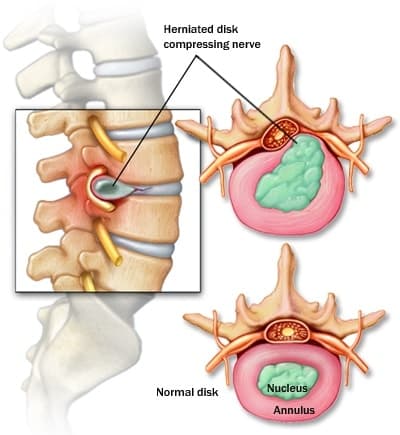A herniated disc, or "ruptured" disc, is a condition where the soft, jelly-like center of a spinal disc pushes through the tougher outer ring. With injury or degeneration, the soft nucleus can bulge out from its fibrous capsule and compress local structures, as well as release potent inflammatory mediators that further irritate the nerves. It commonly occurs in active individuals aged 20 to 40 years.

Herniated Discs
Overview
What is a Spinal Disc?
Each spinal disc is made of two parts: a tough, fibrous outer layer called the annulus fibrosus and a soft, jelly-like inner core known as the nucleus pulposus. These discs function as shock absorbers and allow the spine to bend, twist, and move with daily activities.
Causes
A disc herniation is most often the result of age-related degeneration and wear and tear. Over time, the discs lose water content, becoming less flexible and more prone to tearing. While this process is gradual, a herniation can be triggered suddenly by an event like improperly lifting a heavy object, a fall, or a direct blow to the back.
Symptoms
The symptoms of a herniated disc depend on its location and which nerves are affected.
- Pain: The most frequent symptom. It may be sharp, shooting, or constant burning pain radiating along the affected nerve.
- Lumbar herniations → radiate to the leg
- Cervical herniations → radiate to the arm
- Numbness and Tingling: "Pins and needles" or loss of feeling in the affected limb.
- Muscle Weakness: Severe compression can lead to weakness or loss of coordination in the muscles it controls.
- Loss of bowel or bladder control: In rare cases, compression affects the nerves controlling bowel and bladder function, requiring emergent medical evaluation.
Non-Surgical Treatments
- Physical Therapy and Exercise: Strengthening core and back muscles to improve stability; nerve gliding stretches to relieve nerve pressure.
- Lifestyle modifications: Maintaining a healthy weight, avoiding activities that aggravate the pain, and practicing proper lifting mechanics to prevent recurrence.
- Medications: Over-the-counter anti-inflammatory drugs (ibuprofen, naproxen) are first-line. If ineffective, stronger prescriptions such as nerve pain medications or short-term oral steroids may be used.
- Injections: Steroid injections can sometimes provide temporary relief by reducing inflammation around the foramen and nerves.
Surgical Treatment
Surgery is considered a last resort, reserved for patients who do not respond to non-surgical options or who experience severe, debilitating pain or concerning neurologic deficits.